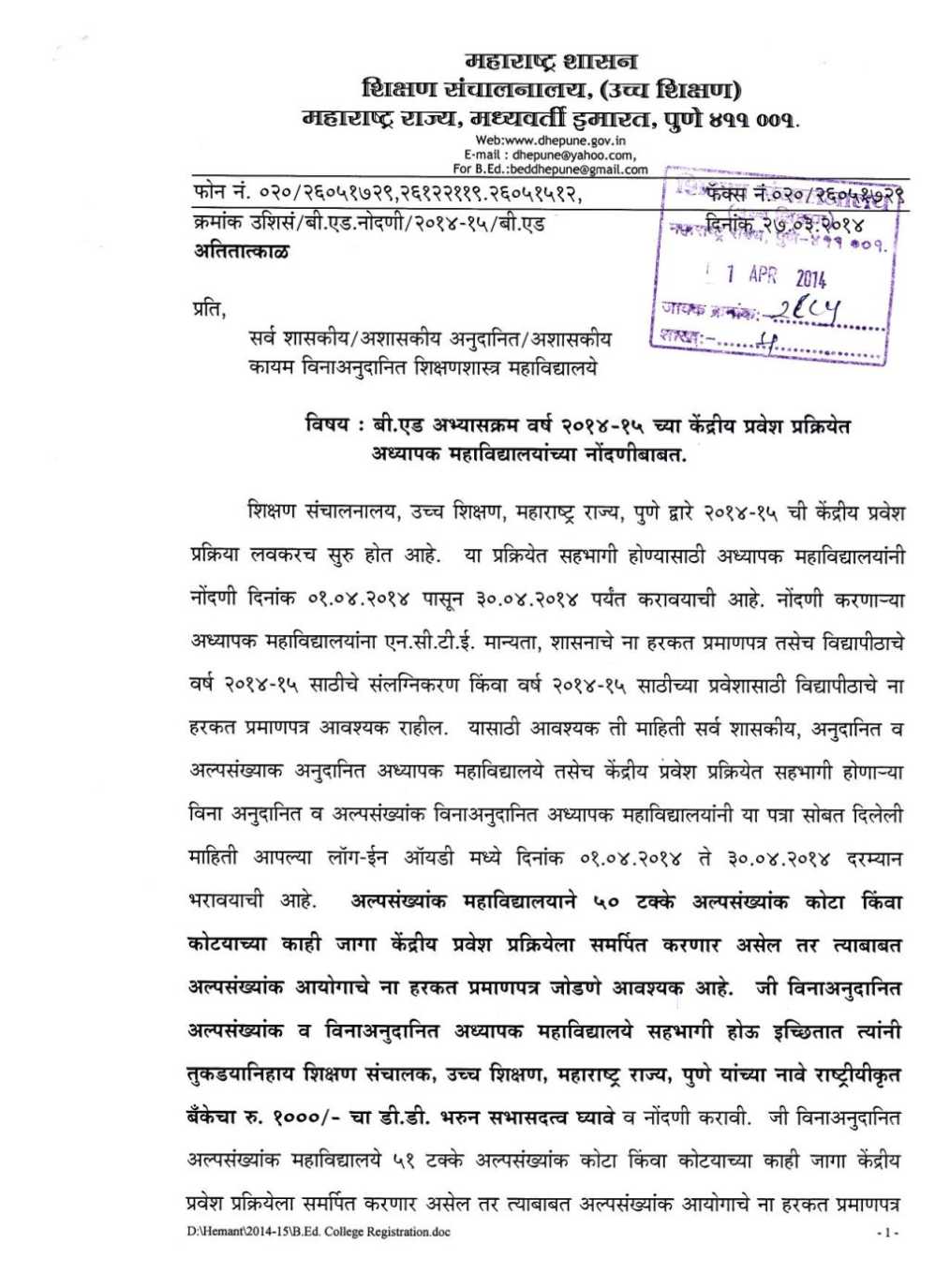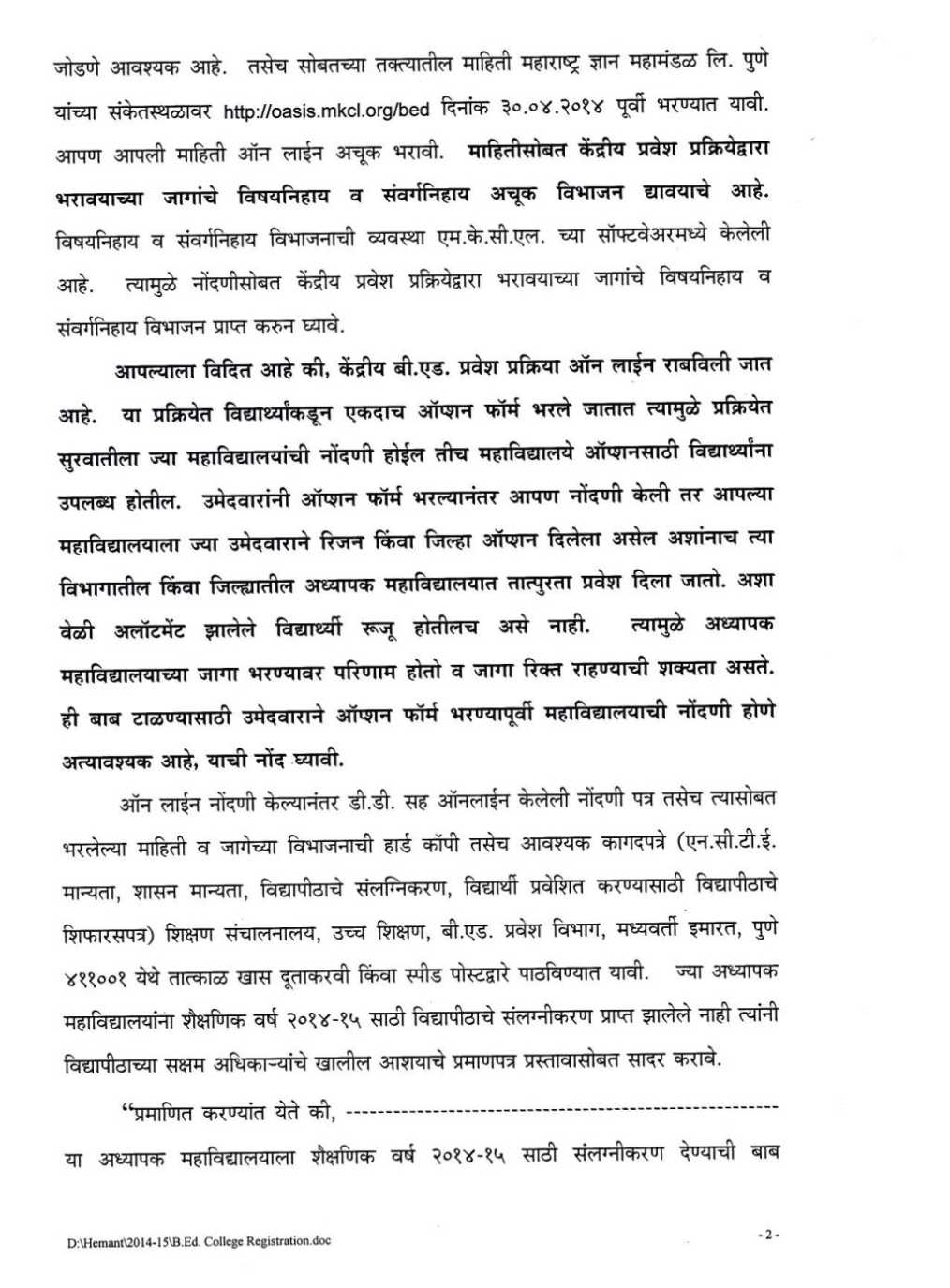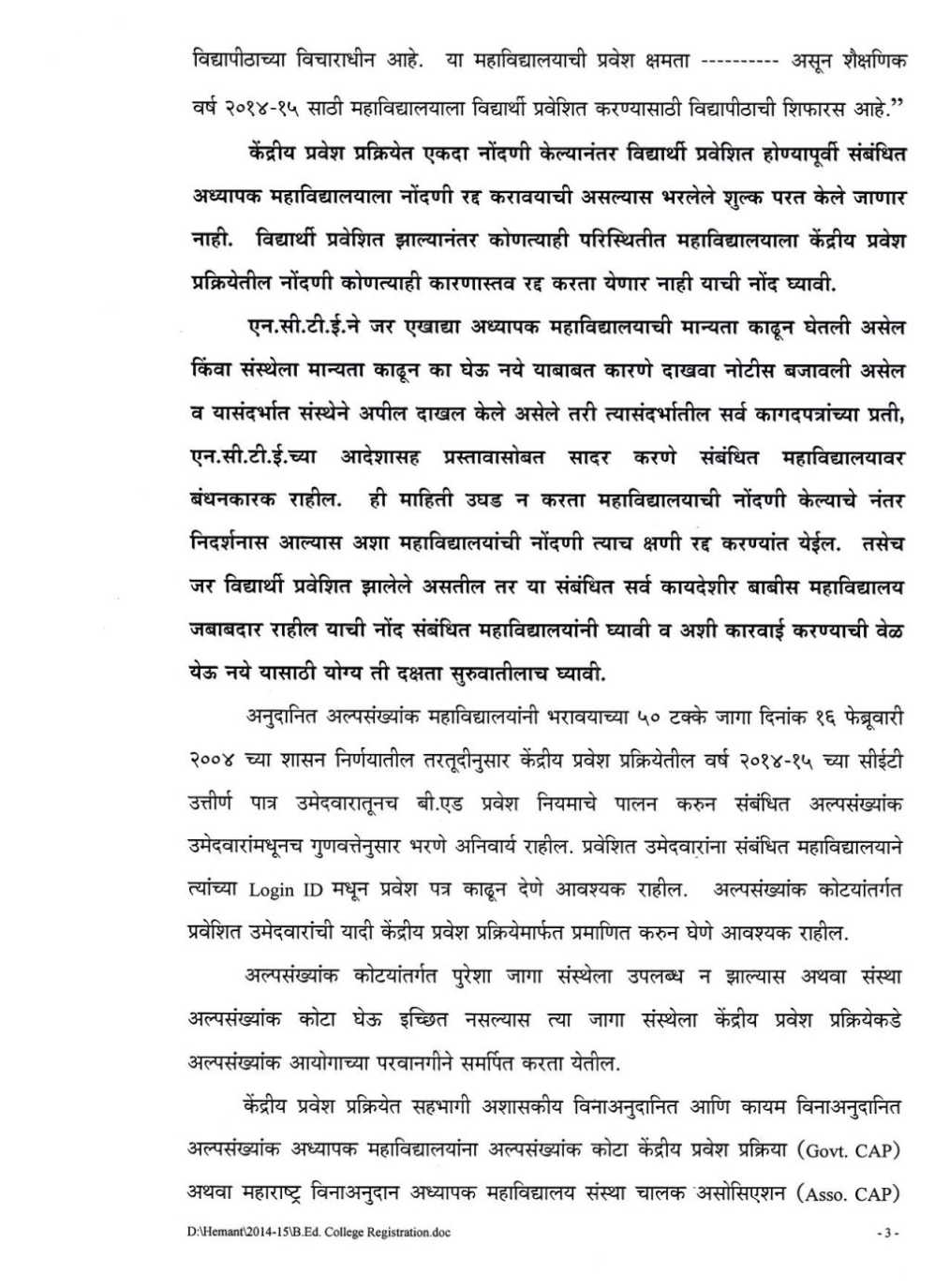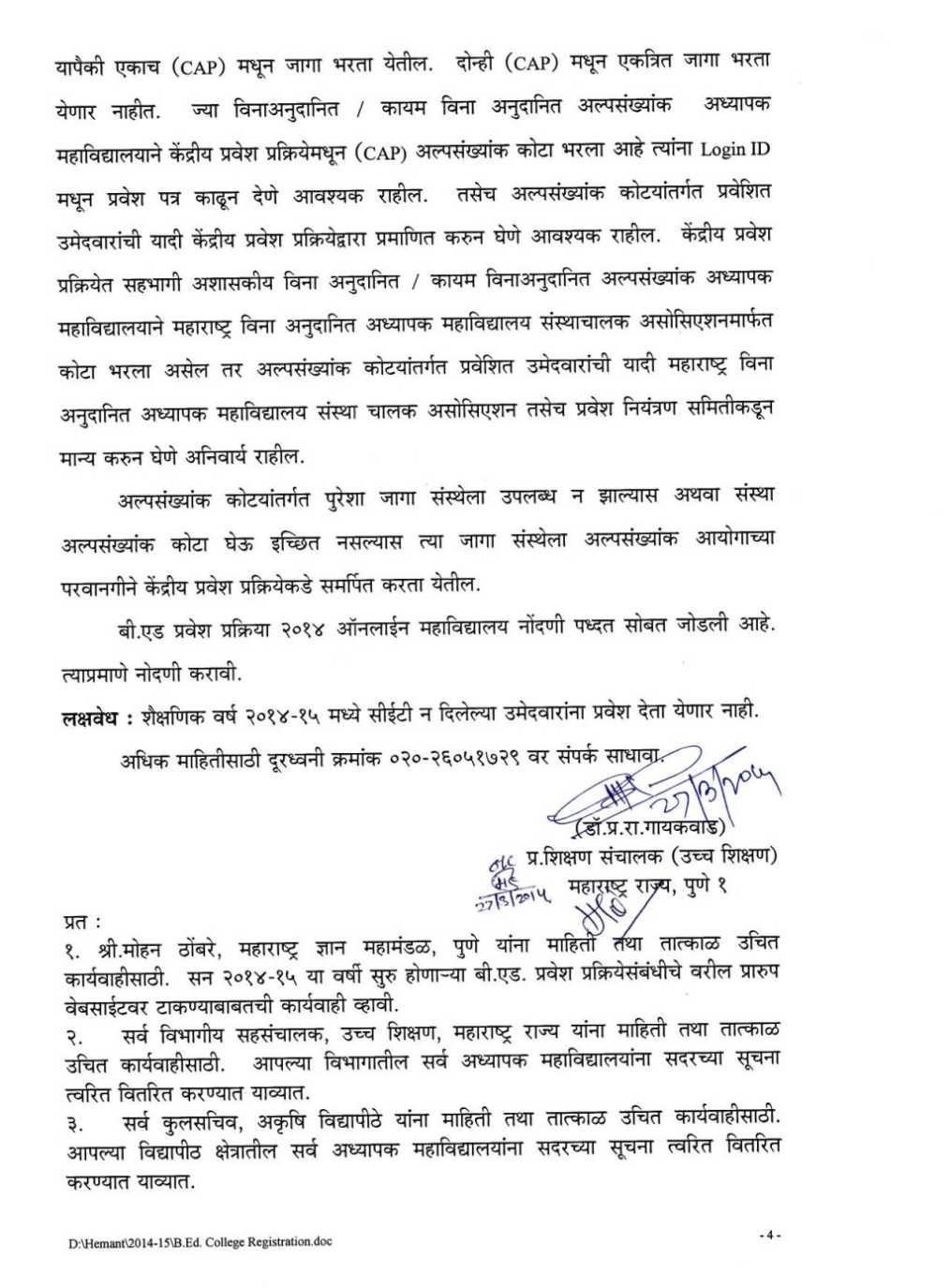| Re: B.Ed. after 12th from Pune University
Pune University offers B.Ed course of 1 year Duration in English and Marathi medium
But you are not eligible for doing B.Ed after 12th, the minimum qualification required for B.Ed is graduation degree
So firstly complete your graduation degree than you will be eligible for it
Eligibility for Pune University B.Ed course:
Must have passed Bachelor's degree/Master's degree from recognized university with at least 45% marks
Selection Procedure:
Selection for Pune University B.Ed admission will be on the basis of written test and personal interview.
Pune University B.Ed Syllabus
COURSE 101
EDUCATION FOR DEVELOPMENT IN THE 21ST CENTURY
Objectives: - To enable student teacher to
1. get acquainted with the general natural nature of the Indian Society in 21st century.
2. understand the meaning and scope of education and its philosophical basis.
3. become aware about goals of education and life in 21st century.
4. become aware about the national goals and provisions of education mentioned in the
Indian Constitution.
5. comprehend and appreciate the teachers role in shaping the modern Indian society.
6. realize the contribution of educational thinkers.
7. appreciate the social aspect of educational problems faced in Indian Society in 21st
century.
8. become familiar with the agencies of education and mass communication media.
9. become conversant with the social aspects of education and human values.
10. know the new concepts i.e. LPG
11. identify the contribution of NGO’s in education.
12. understand the relationship between education and development.
UNIT 1:-EDUCATION AND PHILOSOPHY 1 CREDIT
1.1 Concept, scope, functions and relationship between Education and Philosophy.
1.2 Aims and Principles of pre-independence (Vedic, Islamic, Buddhist, Jainism)
1.3 Post-Independence philosophy of education Constitution Kothari Commission NCF
(2005), State Policy on Education 2010
UNIT 2:- ASPECTS OF EDUCATION 1 CREDIT
2.1 Integration of Liberal and Vocational Education
2.2 Education for democratic citizenship and National integration
2.3 Education for Human Rights
2.4 Education for Peace
UNIT 3:- THINKERS AND TEACHERS 1 CREDIT
3.1 Mahatma Gandhi (with special reference to basic education)
3.2 Mahatma Phule and Savitribai Phule (with special reference to education)
3.3 Dr. Babasaheb Ambedkar – Educational thoughts
3.4 John Dewey
3.5 Role and Skills for teacher in 21stcentury
UNIT 4:- INDIAN SOCIETY IN 21ST CENTURY 1 CREDIT
4.1 Liberalisation, Privatisation and Globalisation in Indian Society
4.2 Forces working in Indian Society and role of Education in social change
4.3 Agencies of Education in Indian Society
a) Family
b) State
c) Group – Peer and Reference
d) Non-Government Organisations
e) Different ways of access to education
4.4 School as Community development centre (Role and Functions)
UNIT 5:- EDUCATION AND DEVELOPMENT 1 CREDIT
5.1 Relation between education and development
a. Meaning of development
b. Education and development of the individual
c. Education and development of the society
d. Education and national development
e. Education for sustainable development
5.2 Government and Non-Government efforts for empowering the weaker sections efforts
a. Women
b. Minorities
c. Backward class
d. Contribution of NGO for weaker sections
5.3Role of mass communication media in social development
a. Strength and role of mass communication media (Print Media and Electronic
Media)
b. Precautions while using mass communication media
Practical (any one)
1. Study of any thinker (apart from those mentioned in the syllabus)
2. Study of Educational Contribution of Non-Government Organisation
3. Role of mass media in education
References:
10. Walia J.S. Principal and methods of Education Rai B.C – Theory of Education - Sociological and
Philosophical bases of Education.
11. Chobhe Dr. S. P. and Akhilesh - Philosophical and Sociological foundation of Education.
12. Bhatia Kamala and Bhatia - Baldev - The Philosophical and Sociological foundation of Education.
13. Gaind D.N. and Sharma R. P. - Education Theories and Modern Trends.
14. Rai B.C - Theory of Education - Philosophical and Sociological bases of Education.
15. S.S. Mathur - A Sociological approach to Indian Education.
16. NCERT - The Teacher and Education in Emerging Indian Society
17.TofflerAlwin - The future shock
COURSE 102
PSYCHOLOGY OF THE LEARNER AND LEARNING
Objectives: To enable the student teacher to:
1. understand the growth and development of the learner and its importance in the
learning process with special reference to adolescent stage.
2. become aware regarding the individual differences among learners
3. identify the educational needs of diverse learners.
4. get acquainted with the new (contemporary) theories of learning.
5. become acquainted with the social aspects of behaviour
6. deal with behavioural and social problems of the learner
7. become familiar with the concepts of adjustment, stress management and self concept.
8. find co relation between adjustment, stress management and self-concept and
classroom behaviour.
UNIT 1: UNDERSTANDING THE GROWTH AND DEVELOPMENT OF THE
LEARNER: - 1 CREDIT
1.1 Heredity and environment; social heredity - meaning, nature, importance in teaching
learning process
1.2 Growth, Maturation and Development of the learner:
a) Differences between growth and development
b) Principles of growth and development
c) Relationship between development and learning
d) Stages of Growth and Development
e) Adolescence stage: (Physical, mental, emotional, moral and social aspects)
1.3 Facilitating holistic development: Implications for education (school, teacher,
parents) w.r.t. to adolescence stage
UNIT 2: LEARNER DIVERSITY: - 1 CREDIT
2.1 Individual differences (age, sex, intelligence, multiple intelligence, emotional
intelligence, socio economic background, interests, introvert and extrovert.),
implications for learning
2.2 Concept of Inclusive Education and Children with Special Needs:
a) Inclusive Education: concept and need
b) Children with Special Needs: Characteristics of visually impaired (challenged),
hearing impaired (challenged), learning disabled, slow learners, gifted, creative,
mentally retarded and physically challenged.
c) Teacher’s role in educating them in general classrooms.
2.3 Diversity in learning styles:
a) Meaning and concept of learning styles
b) Types of learning styles (Visual, Auditory and Kinesthetic)
c) Implications for learning
2.4 Diversity due to multiculturalism:
a) Meaning and concept of multiculturalism,
b) Differences in learners arising due to multiculturalism
c) Role of the teacher in a multicultural classroom
UNIT 3: LEARNING THEORIES AND INSTRUCTIONAL STRATEGIES:-
1 CREDIT
3.1 Learning –
a) Meaning and Process,
b) Factors affecting learning (Individual and Environmental: Maturation,
Motivation,Attention, Fatigue)
c) Transfer of learning: concept and types
d) Implications for learning
3.2 Theories of Learning by:
a) Thorndike,
b) Pavlov
c) Skinner
d) Implications for learning of the above theories: Relevance in learning, Role of
teacher and Role of learner.
3.3 Constructivism: Cognitive constructivism and Social Constructivism (concept
and features)
a) 5 E Model
b) Cooperative and Collaborative Learning
c) Implications of Constructivism for learning: Relevance in learning, Role of
teacher and Role of learner.
3.4 Brain based learning: Principles and Educational Implications.
3.5 Theory by:
a) Pavio – Dual coding theory
b) Implications of the theory for learning: Relevance in learning, Role of teacher and
Role of learner.
UNIT 4: COGNITIVE AND AFFECTIVE MENTAL PROCESSES AND
LEARNING 1 CREDIT
4.1 Sensation and Perception: Gestalt Principles
4.2 Memory and Forgetting
4.3 Thinking: Imagination, Problem solving and Creativity
4.4 Concept formation: Definition, Types and Steps
4.5 Techniques for facilitating learning and creativity: Concept Mapping and Mind
Mapping, Brain storming.
UNIT 5: MANAGING CLASSROOM BEHAVIOR FOR FACILITATING
LEARNING: - 1 CREDIT
5.1Social aspects of behaviour – group dynamics, motivation, suggestion, sympathy,
imitation, group conformity, group rivalry
5.2 Dealing with behavioural problems – inattentive learners, disruptive behaviour,
aggression, positive behavior support (PBS)
5.3 Dealing with social problems – child abuse, child exploitation, social networking
5.4 Dealing with adjustment problems, defense mechanisms, conflicts, stress
management, frustration, self-concept (superiority or inferiority)
5.5 Implications for learning: Role of teacher and Role of learner.
Practical: (any one from the given list)
1. Case study of an adolescent learner
2. Case study of a learner with special needs
3. Plan and implementation of one lesson using constructivist approach/ 5 E/ Brain
Based Principles of learning
4. Experiment on i) Memory Retention, ii) Perception, iii) Imagination
5. Administration and Interpretation of any psychological test
6. Construct and prepare a concept map on any unit or topic.
References:
1. Hans Raj Bhatia - A Textbook of Educational Psychology , Macmillan Ltd.
2. S.B. Kakkarand Mahesh Bhargava - In Education and Psychology, H.P. Bhargaba Books House.
3. Ram Nath Sharma and Ruchana Sharma – Experimental Psychology Atlantic, Delhi
4. A.R. Rather - Psychology of learning and Development Discovery publishing House, New Delhi
5. Shamshad Hussain- Human behaviour, H.P. Bhargava Book House,Agra.
6. Tara Chand - Modern child Psychology, Anmol Publications, New Delhi.
7. Tara Chand - Educational Psychology, Anmol Publication, New Delhi
8. Aparna Chattopadhaya - What's your Emotional I.Q., PustakMahal Delhi
9. S.P. Chaube - Educational Psychology and Educational Statistics, Lakshmi NarainAgarwal, Agra.
10. Alice Rajkumani, Rita SugunaSundari, Digumarti Bhaskara Rao - Educational Psychology,
Discovery Publishing house New Delhi.
11. W.N. Dandekar - Experimental Psychology, Anmol Prakashan, Pune.
12. K.K. Bhatia and Trinath Purohit - Educational Psychology and Technique of Teaching , Kalyani
Publishers Ludhiana.
13. S.K. Mangal - Educational Psychology, Tandon Publications, Ludiana.
14. D. Bhatia, D.K. Walia, J.C. Mangaland T.C. Datt., - Educational Psychology Doaba House, Delhi.
15. S.K. Mangal - Advanced Educational Psychology, Prentice hall of India, New Delhi.
16. W.N. Dandekar and Sanyoglata Makhija – Psychological Foundations of Education , Mac Millan
India Ltd. Delhi.
17. Sarla Nasa - Educational Psychology, A Mittal Publications, New Delhi.
18. Dandapani S. (2000) - A Textbook of Advanced Educational Psychology, Anmol Publication Pvt.
Ltd, New Delhi.
19. Chavan S.S (2006) - Advanced Educational Psychology.
20. Panda K.C. (1997) - Education of exceptional children, Vikas Publishing House Pvt. Ltd. New
Delhi.
21. A Special Education Research and trends (1986) - Edited by Richard J. Maris Burton Blatt, USA
Pergamon Press.
Contact Details:
Savitribai Phule Pune University
Ganeshkhind, Pune, Maharashtra 411007
020 2569 6061
Map location:
[MAP]Savitribai Phule Pune University[/MAP]
|




